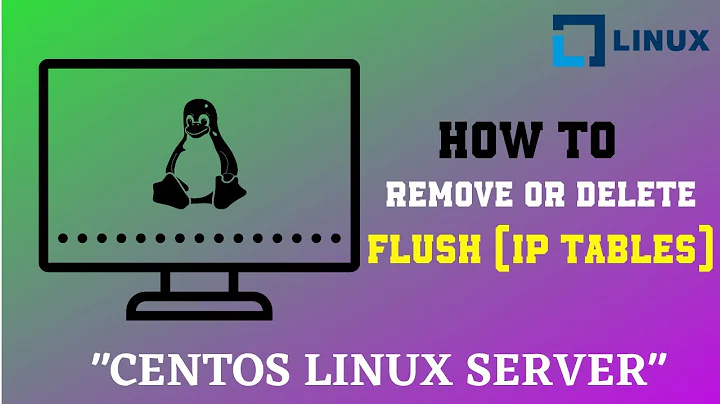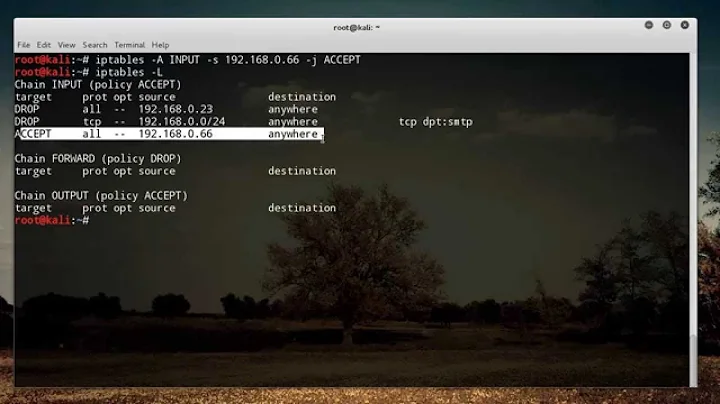Delete a iptables chain with its all rules
Solution 1
You can't delete chains when rules with '-j CHAINTODELETE' are referencing them. Figure out what is referencing your chain (the link), and remove that. Also, flush then kill.
-F, --flush [chain]
Flush the selected chain (all the chains in the table if none is given). This is equivalent to deleting all the rules one by one.
-X, --delete-chain [chain]
Delete the optional user-defined chain specified. There must be no references to the chain. If there are, you must delete or replace the referring rules before the chain can be deleted. The chain must be empty, i.e. not contain any rules. If no argument is given, it will attempt to delete every non-builtin chain in the table.
Solution 2
This is potentially off-topic, but it's what I did after I found this post! For some use cases the iptables -D option might be useful. Since it allows you to clear out referring rules added programmatically with -A (if you know precisely how you added them).
E.g
iptables -N MYCHAIN
iptables -A INPUT -i interface -j MYCHAIN
iptables -A MYCHAIN -j ACCEPT
can be reversed with
iptables -D INPUT -i interface -j MYCHAIN
iptables --flush MYCHAIN
iptables -X MYCHAIN
Solution 3
You need two steps, but this does it in one command.
Create a file, and place this in it.
# Empty the entire filter table
*filter
:INPUT ACCEPT [0:0]
:FORWARD ACCEPT [0:0]
:OUTPUT ACCEPT [0:0]
COMMIT
Save the file as "clear-all-rules". Now, do this command:
iptables-restore < clear-all-rules
Now you can clear it anytime with just one command.
Solution 4
Here's an alternate plan. It involves three commands, not one, but with luck, it should work.
Dump your iptables ruleset to a file:
iptables-save > /tmp/iptables.txt
Remove ALL uses of (and references to) the offending chain:
sed -i '/i_XXXXX_i/d' /tmp/iptables.txt
Then reload the ruleset:
iptables-restore < /tmp/iptables.txt && rm /tmp/iptables.txt
Solution 5
In the iptables man file there is an option -S
S, --list-rules [chain] Print all rules in the selected chain. If no chain is selected, all chains are printed like iptables-save. Like every other iptables command, it applies to the specified table (filter is the default).
By using iptables -S | grep <CHAINNAMEHERE>. For examples:
root@root:~# iptables -S | grep TRAFFICLOG
-N TRAFFICLOG
-A FORWARD -i eth0 -j TRAFFICLOG
you can then see which rules are blocking the deletion of the chain from the table. Go through each rule (except the iptables -N <CHAINNAMEHERE> and delete the rule by using the -D option
-D, --delete chain rulenum Delete one or more rules from the selected chain. There are two versions of this command: the rule can be specified as a number in the chain (starting at 1 for the first rule) or a rule to match.
For example iptables -D FORWARD -i eth0 -j TRAFFICLOG. After you have deleted each rule for your chain flush the chain with the -F option, iptables -F <CHAINNAMEHERE>.
-F, --flush [chain] Flush the selected chain (all the chains in the table if none is given). This is equivalent to deleting all the rules one by one.
Then delete your chain with the -X option, iptables -X <CHAINNAMEHERE>
-X, --delete-chain [chain] Delete the optional user-defined chain specified. There must be no references to the chain. If there are, you must delete or replace the referring rules before the chain can be deleted. The chain must be empty, i.e. not contain any rules. If no argument is given, it will attempt to delete every non-builtin chain in the table.
Iptables is a complicated tool set so an ideal tutorial is needed. You can try one out at www.iptables.info
Related videos on Youtube
timy
Updated on September 18, 2022Comments
-
timy almost 2 years
I have a chain appended with many rules like:
> :i_XXXXX_i - [0:0] > -A INPUT -s 282.202.203.83/32 -j i_XXXXX_i > -A INPUT -s 222.202.62.253/32 -j i_XXXXX_i > -A INPUT -s 222.202.60.62/32 -j i_XXXXX_i > -A INPUT -s 224.93.27.235/32 -j i_XXXXX_i > -A OUTPUT -d 282.202.203.83/32 -j i_XXXXX_i > -A OUTPUT -d 222.202.62.253/32 -j i_XXXXX_i > -A OUTPUT -d 222.202.60.62/32 -j i_XXXXX_i > -A OUTPUT -d 224.93.27.235/32 -j i_XXXXX_iwhen I try to delete this chain with:
iptables -X XXXX
but got error like (tried iptables -F XXXXX before):
iptables: Too many links.
Is there a easy way to delete the chain by once command?
-
Tom O'Connor about 12 yearsI've not seen iptables barf like that before when trying to flush.
-
Ladadadada about 12 yearsJust curious... how many rules is "many" ?
-
timy about 12 years2 many is many :) if I try to delete the rules first, it will like typing many times: iptables -D OUTPUT -d XXX/32 -j i_XXXXX_i
-
Steven Monday about 12 yearsTry this:
iptables-save | grep -v i_XXXXX_i | iptables-restore -
nhed over 10 years@StevenMonday why not write as answer, this is the most useful one (alternative do this via file and edit file). Only thing it does not remove is complete tables ("raw" anyway)
-
Daniel Santos over 2 years@StevenMonday You ingenious bastard! This is the best answer here! ♥
-
-
timy about 12 yearsI just want to find a way to delete the chain(has many '-j CHAINTODELETE' ref rules) directly, but from your answer, it seems impossible :(
-
loislo about 12 years@timy StevenMonday's comment will single-pass remove any references to the chain. Perhaps not ideal, but darned close.
-
 Michael Hampton about 6 yearsThis file exists only on certain Linux distributions, and then only on certain versions of certain Linux distributions.
Michael Hampton about 6 yearsThis file exists only on certain Linux distributions, and then only on certain versions of certain Linux distributions. -
 LinuxGuru over 4 yearsWorks like a charm. iptables -nvL|grep "^Chain.*0 references"|awk '{print $2}'|while read LINE; do iptables -X $LINE; done
LinuxGuru over 4 yearsWorks like a charm. iptables -nvL|grep "^Chain.*0 references"|awk '{print $2}'|while read LINE; do iptables -X $LINE; done -
Hardoman over 3 yearsThis helped a lot because flush cleans the chain itself but not the references to it in the other chains.


![CentOS / Red Hat IPTABLES: Deleting [DROP] and Flushing All Firewall Rules](https://i.ytimg.com/vi/tl_-T2ZQh18/hq720.jpg?sqp=-oaymwEcCNAFEJQDSFXyq4qpAw4IARUAAIhCGAFwAcABBg==&rs=AOn4CLCpzTyBMfguMvQXyfB7d1bIScMBJQ)

